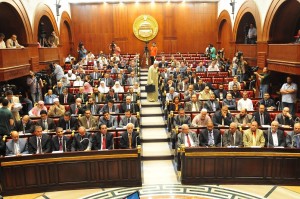
Egypt’s Constituent Assembly will survive long enough to put the draft constitution to referendum after an administrative court on Sunday referred the dissolution case against the assembly, to the Supreme Constitutional Court.
The Administrative Judiciary Court did not rule to either uphold or dissolve the Constituent Assembly, but instead referred the case to the Supreme Constitutional Court to get a ruling on the constitutionality of the assembly’s composition law.
Law 79 of 2012 on the composition of the Constituent Assembly states that parliament’s decision to form the second Constituent Assembly is a parliamentary decision and not an administrative one, thus rendering the case outside of the administrative judiciary’s jurisdiction.
The bill was drafted and passed by the lower house of parliament, the People’s Assembly, in June before the assembly was dissolved but was not signed into law by former Chairman of the Supreme Council of the Armed Forces Field Marshal Tantawi, then de-facto head of state.
President Morsy passed it a month later, which according to former presidential candidate and lawyer, Khaled Aly, is unconstitutional. Bills not signed into law automatically become null and void if the legislative body they originate from ceases to exist, Aly said.
If the Supreme Constitutional Court finds the law unconstitutional then it refers the case back to the Administrative Judiciary Court which would have power to dissolve it.
Muslim Brotherhood lawyer, Abdel Moniem Abdel Maqsoud, said the Supreme Constitutional Court is obliged to wait at least 45 days before starting to view the case, however, giving the Constituent Assembly, which said it would finalise the draft constitution by mid November, ample time to complete it and put it up for referendum, rendering the entire court case moot.
“The Supreme Constitutional Court doesn’t look into cases referred to it until 45 days after the referral,” Abdel Maqsoud said. “Then a body of constitutional commissioners review the case and produce a report with their legal opinion which is then referred back to the constitutional court.”
“The process is extremely time-consuming and it would take at least months for the constitutional court to issue a verdict. Some cases have taken 15 years to be reviewed by the constitutional court,” he added.
Several lawyers claimed that the Constituent Assembly would have to freeze its activities until the Supreme Constitutional Court issues a decision. Constitutional expert and Cairo University professor, Raafat Fouda, said that this claim is false.
The Constituent Assembly is allowed to work until the constitutional court issues its decision, “as long as it hasn’t been resolved, the Constituent Assembly is valid and thus should work,” he said.
“Should the Supreme Constitutional Court’s decision come after the constitution has been voted on and adopted, even if the verdict deems the law unconstitutional, the constitution remains valid,” Fouda said.
He likened it to how the Constituent Assembly remained valid even after the Supreme Constitutional Court ruled that the People’s Assembly, which had established the Constituent Assembly, was unconstitutional and dissolved it.
“Yet, if the Supreme Constitutional Court rules that the law is unconstitutional before the constitution’s adoption, the case would be referred back to the administrative court which would automatically dissolve the Constituent Assembly,” said Fouda. He added that the court taking 45 days until it begins reviewing the case is not set in law.
“The SCC’s decision doesn’t necessarily have to come after 45 days,” Fouda said, “it could take place before or after 45 days; some cases take days while others take years.”
Indeed, in some cases, like the political disenfranchisement law, the Supreme Constitutional Court took only days to rule on the law’s constitutionality.
“The disenfranchisement law had its own special circumstances,” Abdel Maqsoud said.
The law was referred to the Supreme Constitutional Court by the Presidential Elections Committee to issue a verdict on it before the run-off round of presidential elections, where Ahmed Shafiq was running. Shafiq could have been disenfranchised if the SCC had deemed the law constitutional, which it did not.
“I believe the administrative court’s verdict is a positive one, since it gives the Constituent Assembly a chance to be done with drafting the constitution,” Abdel Maqsoud said, confirming that if the SCC deems the law unconstitutional after the constitution’s adoption, a scenario which Abdel Maqsoud believes to be highly likely, the constitution would not be affected.
Recent conflict between the Supreme Constitutional Court and Islamists, who make up a majority of the Constituent Assembly, have subsided recently after the assembly agreed to adopt all of the court’s suggested changes regarding its standing in the new constitution. Supreme Constitutional Court judges initially expressed dissatisfaction with the original draft for its articles regarding the court.
Following the administrative court’s decision to refer the case to the constitutional court, supporters of the Muslim Brotherhood broke into chants of “God is great” and “the remnants [of the previous regime] have fallen,” while those opposing the assembly accused the court of making a deal and chanted “change, freedom, dissolution of the Constituent Assembly.”
“This ruling is definitely in favour of the Muslim Brotherhood, it is a political ruling. I know the assembly will be dissolved, but when?” said former independent member of parliament, Hamdy El-Fakharani. He called on all “national powers” to immediately form a “parallel” Constituent Assembly.
Al-Dostour Party founder, Mohamed ElBaradei, and Popular Current leader, Hamdeen Sabahy, called for a press conference where they will launch the “revolutionary democratic constitution” initiative.
The two previously released a declaration in September signed by several political groups and figures denouncing the Constituent Assembly and calling for the boycott of all its actions.
